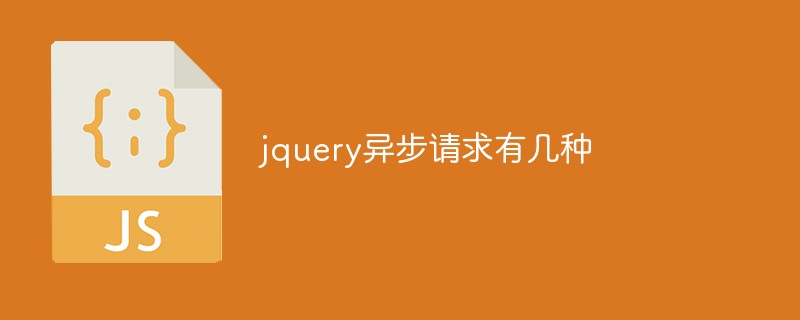
There are 4 types of jquery asynchronous requests: 1. Ajax request, the syntax is "$.ajax({name:value,...})"; 2. Get request, the syntax is "$.get(url, pass Parameters, callback function, type)"; 3. getJSON request, supports cross-domain calls; 4. post request.

The operating environment of this tutorial: windows10 system, jquery3.2.1 version, Dell G3 computer.
The first Ajax request:
$.ajax(): is the core method.
$.ajax() method is a powerful and direct way to create Ajax requests. It is passed an options object as a parameter, and the properties of this options object configure all the instructions required to complete the request.
$.ajax() provides success and failure callback functions.
Syntax:
$.ajax({name:value, name:value, … })Save data to the server, display information when successful
$.ajax({
type: "POST",
url: "some.php",
data: "name=John&location=Boston",
success: function(msg){
alert( "Data Saved: " + msg );
}
});Comments:
type: (default: "GET"), request Method ("POST" or "GET") Other request methods are only supported by some browsers.
url: (Default current page address) The address to send the request.
data: stored data.
success: Called after the request, the returned data and the string containing the success code are transferred.
Function() needs to store the global variables declared on the controller side
The second $.get() request:
Syntax:
$.get(url address, parameter passed by param, callback function, return value type)
Note:
Parameters: optional;
Return value type: The type can be automatically matched according to the data (generally can be omitted)
(via remote HTTP GET request loads information. This is a simple GET request function to replace the complex $.ajax. The callback function can be called when the request is successful. If you need to execute the function when an error occurs, use $.ajax.)
Description:
Display test.php return value (HTML or XML, depending on the return value).
jQuery code:
$.get("test.php", function(data){
alert("Data Loaded: " + data);
});Third $.post() request:
Syntax:
$.post (url address, parameters passed by param, callback function, return value type)
Note:
Parameters: Optional;
Return value type: The type can be automatically matched according to the data (generally can be omitted)
(Load information through remote HTTP POST request)
Description:
Output results from the requested page test.php (HTML or XML, depending on what is returned):
jQuery Code:
$.post("test.php", function(data){
alert("Data Loaded: " + data);
});The fourth $.getJSON() request:
##$.getJSON() is specifically Set up for ajax to obtain json data, and supports cross-domain calls. Note: JSON is an ideal data transmission format. It can be well integrated with JavaScript or other host languages and can be used directly by JS. Syntax: $.getJSON(url address, parameter passed by param (optional), callback function)(Load JSON data through HTTP GET request)jQuery Code:
$.getJSON("http://api.flickr.com/services/feeds/photos_public.gne?tags=cat&tagmode=any&format
=json&jsoncallback=?", function(data){
$.each(data.items, function(i,item){
$("<img src="/static/imghw/default1.png" data-src="https://img.php.cn/upload/image/454/966/389/1652843013800034.png" class="lazy" / alt="There are several types of jquery asynchronous requests" >").attr("src", item.media.m).appendTo("#images");
if ( i == 3 ) return false;
});
});
The above is the detailed content of There are several types of jquery asynchronous requests. For more information, please follow other related articles on the PHP Chinese website!